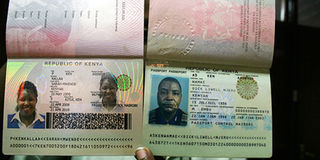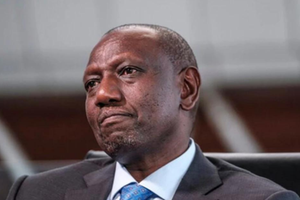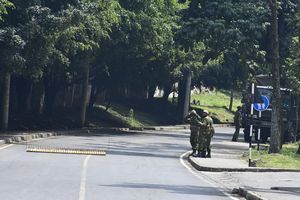New Kenyan passports acquire hi-tech features

Sample of the new Kenyan passport at left and the old one at right. The new one has two photographs. Photo/WILLIAM OERI
What you need to know:
- Electronically printed photograph cannot be replaced unless one rips off the page
Have you ever wondered why the Ministry of Immigration takes your photograph besides those you attach to your passport application form?
Some applicants think this is meant to make their life difficult, but the Saturday Nation has learnt that the photo is meant to be printed electronically on the bio-data page of your travel documents.
The move is part of a wider strategy to enhance the security features of passports. In the past, the picture was only attached to the passport manually, making it easy for criminals to replace and thus steal other people’s identities.
The new security features will be in line with internationally accepted standards to protect the security and integrity of passports. It is, in fact, a step towards issuing e-passports in future.
The move constitutes part of the wider plan for countries to harmoniously heighten the fight against terrorism and combat transnational organised crime.
With the April 2010 deadline set by the International Civil Aviation Organisation (ICAO) resolve to improve security of travel documents fast approaching, Kenya has just met part of the requirements.
As travel documents are becoming more secure, increased emphasis is being placed on the security of their handling and issuance process to help prevent terrorists or criminals from acquiring legitimate documents under false identities.
In addition to the “ghost photo” on the bio-data page of the passport, the pages have intricate designs with complex watermarks. In fact, every page in the passport has a picture of one of the “big five” animals coming in a unique sequence known only to the immigration officials.
The photos are generated from the live capture that takes place at the ministry’s issuance points. They cannot be replaced, unless one tears off the page altogether, thus mutilating the passport and rendering it unusable.
The new document will be valid for a minimum of 10 years, not five as is currently the case.
It will also be bigger, with those for mid level travellers having 48 pages and heavy travellers having 64 pages. The old passport has a minimum of 32 pages.
There were fears that the new look passport would be more expensive but Immigration officials maintained that the cost remains Sh3,040.
This is the fourth time since independence that the face of passports is changing.
With the new passport, it is easier for one to be cleared at border points internationally, Immigration minister Otieno Kajwang’ told the Saturday Nation.
“We are, however, moving to new technology where the new passports will have a new design with additional security features, including a chip with the holder’s facial biometric. In fact, all the information on the bio-data page will also be captured and stored in the chip for cross reference,” said Mr Kajwang’.
Although the new biometric passport will appear very similar to the current one externally, it will feature a logo indicating that there is a chip inside.
Internally, the chip will be visible.
“We have not floated the tender for the supply of the chips yet. This is because we have a lot of passports printed and we would like to clear the backlog. By end of the year, however, tenders would have been published,” said the minister.
The United Kingdom became the first to issue the biometric e-passport in 2006.
The data in the chip is programmed according to the logical data structure specified by ICAO, and the data is digitally “signed” to ensure it is valid.
A specially tailored Public Key Infrastructure (PKI) project has been specified in order to protect the signed data from counterfeiting or unauthorised alteration by ensuring that any overwriting on the chip does not go undetected.
It was not clear by the time of going to press, how much the government will spend on the new venture as the ministry remained tight-lipped on the subject. It is said details are being worked out.
Recall old ones
Although passports with enhanced features but without a chip are already in circulation, there are no plans to recall the old ones.
“They will be used alongside the old ones. Those with the old passports can also voluntarily acquire new ones,” said ministry spokesman Elias Njeru.
Application could also become less tedious as applicants can monitor the process through short message service (SMS) number 2032.
The Immigration ministry receives about 400 passport applications every day in Nairobi alone. There are branches in Mombasa, Kisumu and a new one in Garissa was opened a fortnight ago.
Meanwhile it has emerged that most Kenyans adopt new lifestyles when they settle abroad. Some do not even want to be bothered with what is going on back home. But this is not what worries Dr Chege Karogi most.
As founding president of the Kenya Christian Fellowship in America, Dr Karogi is concerned that these Kenyans stick to ethnic groupings.
People from the same communities still stick together and rarely mingle with others, said Dr Karogi.
He gave an example of Dallas, Texas, where there are about 20,000 Kenyans, most of whom only associate along ethnic lines. “Our association is trying to demystify this. We encourage multi-ethnic association.
That is why, even when I founded it, I ensured that the leadership reflected multi-ethnic representation from Kenya,” he told the Saturday Nation in Nairobi. But the task was very difficult, according to him, because some people still considered the association an ethnic outfit.
“I had to visit these groups and encourage them to avoid their tribal alignment which, in my opinion, is retrogressive,” said Dr Karogi.
Last year, after the disputed General Election in Kenya that triggered violence, the ethnic misunderstanding played itself out even in the US, Dr Karogi said.
“Although we did not demonstrate and riot on the streets as was the case here, the same hatred was evident. Negative tribalism played out very clearly,” he said.
Hit headlines
It is at this time that Kenya hit headlines in the global media, for all the wrong reasons.
The headlines had phrases like “Tribal violence spirals in Kenya”, “tribal war”, “tribal blood-letting”, “tribalism rampant in Kenyan workplace” and “ethnic cleansing”.
More than 1,000 Kenyans lost their lives. Dr Karogi gave an account of a church in Birmingham, Alabama, where a whole group of Kenyans from one community stormed out and have since formed a new church of their own.
A similar incident happened in Dallas.
“Their previous church was headed by a person from a community perceived to be fighting their own in Kenya,” said Dr Karogi.




